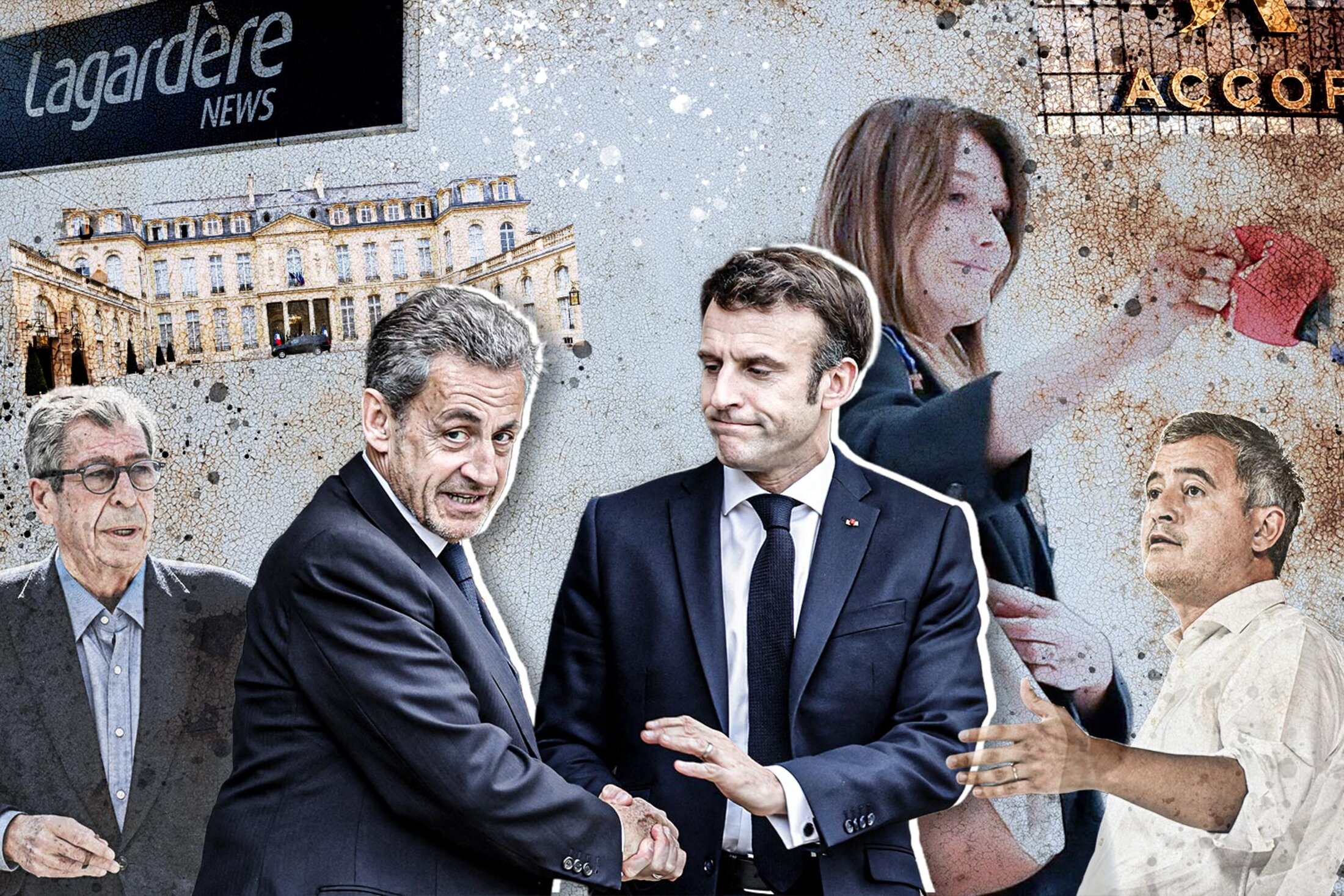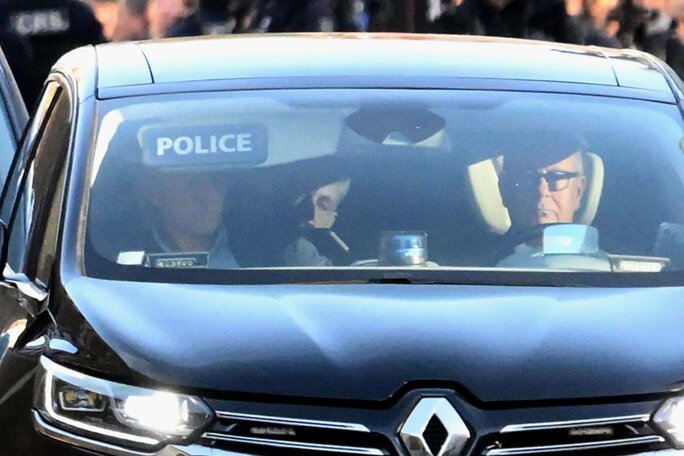The imprisonment of Nicolas Sarkozy has provided France with a fascinating political, media and social spectacle. As the former president of the Republic, sentenced to five years in prison for criminal conspiracy in the Libyan affair, entered La Santé prison in Paris on October 21st to spend his first night behind bars, part of the country appeared divided over the meaning of this historic event.
A rational mind might think that it is a particularly fitting time for collective reflection – finally – on the state of public probity in France and the existential threat that its decline poses to our democracy. And all the more so in a country that has already seen a former president definitively convicted for corruption (Nicolas Sarkozy, again), his predecessor definitively convicted for embezzlement of public funds (Jacques Chirac) and their respective prime ministers (François Fillon and Alain Juppé) also convicted.
But no. Most of the airtime devoted to the Libyan affair on the news channels has been dancing to a very different tune: one in which Nicolas Sarkozy, who has appealed the ruling and once again benefits from the presumption of innocence in this case, is seen as a victim. The victim of a judiciary whose judges are portrayed as a mixture between the Spanish inquisitor Torquemada and the French Revolution's Robespierre. The victim of a press – with Mediapart at the head of the pack - supposedly writing with a knife clenched between its teeth and “forged documents” in its bag.

Enlargement : Illustration 1

And he, Nicolas Sarkozy, has seemingly become the sacrificial prey of a vile plot, with the former president willing to summon the (fictional) ghosts of Monte Cristo – from the novel by Alexandre Dumas - or the (very real) Captain Dreyfus to compare himself to them. And all done with out a semblance of shame.
For the past month, ever since the verdict was delivered, a large part of the political and media establishment – with Nicolas Sarkozy, the two have always been one and the same – has been tenderly holding his hand through this ordeal. The most recent, and one of the most shocking, episodes was when President Emmanuel Macron, who is constitutionally the guarantor of the independence of the judiciary, discreetly received him at the Élysée Palace on Friday October 17th. This was four days before the announced date of Sarkozy's imprisonment.
Even before this, on October 8th, President Macron's current chief of staff, Emmanuel Moulin, had attended a pre-incarceration farewell party organised by Nicolas Sarkozy. Then there is the minister of justice, Gérald Darmanin, who in recent weeks has increased the frequency of his displays of deference towards the convicted man, going so far as to announce live on France Inter radio station that he would personally visit the former head of state in La Santé prison. One might note, in passing, that Gérald Darmanin – once a fierce critic of the prison system's supposed laxness - no longer considers jail to be a bit too much like Club Med when his former political mentor is sent there.
A need to erase the facts...
Some leading groups listed on the French stock exchange, the CAC 40, are standing by him too. The Accor hotel group and Lagardère – owner notably of Le Journal du dimanche (JDD) newspaper and Europe 1 radio – have announced that they will keep Nicolas Sarkozy as a board member despite his imprisonment. This is also what they have done in the past despite his conviction for corruption in the so-called Bismuth phone-tapping affair and his double conviction for illegal campaign financing in the so-called Bygmalion scandal. This latter case is currently before the country's highest appeal court, the Cour de Cassation, which will give its ruling on November 26th.
As for the former president’s inner circle, their reaction gives one the impression that France has become one vast episode of the American satirical cartoon series South Park. His wife, Carla Bruni, has posted a string of Instagram stories (for instance, a cover of The Beatles’ “Let It Be”, quickly parodied as “Let Libye”- with 'Libye' being the French word for Libya). His friend Patrick Balkany offers advice on television about prison life – something the former MP and ex-mayor of the well-heeled Paris suburb of Levallois-Perret knows about, having been jailed for “persistent fraud”. And his son, Louis Sarkozy, called for a demonstration outside his father’s home on the morning of his transfer to prison, for supporters to show their unflinching backing for the former head of state.
From start to finish, it has been a dismal spectacle for ordinary people. But the issue is far more serious than that. For what is at stake is not a legitimate debate about the immediate enforcement of court rulings, about whether someone should be jailed before their appeal is heard or not. Instead, what we are witnessing is nothing less than the deadly convulsions of a cartel that, without admitting it publicly, is simply seeking the return of privilege that was abolished in France on the night of August 4th 1789. One might call it a powerful yearning for August 3rd. It is no coincidence that, writing in the columns of the hard-right publication Valeurs actuelles, the journalist Catherine Nay, once one of the most influential reporters of her generation, described the judgement convicting Nicolas Sarkozy as a “judicial regicide”.
“Supporters of Nicolas Sarkozy are undermining the foundations of democracy by flooding the public space with noise, confusion and fury,” Philippe Conte, emeritus professor of criminal law at Panthéon-Assas University, recently stated in a remarkable interview with Le Monde.
To achieve this destruction of the spirit of the Republic, this small elite has an urgent need to erase reality. In other words, to make people forget the facts over which Nicolas Sarkozy was convicted, along with his two closest staff, Brice Hortefeux and Claude Guéant. Without the facts, which the court described as being of “exceptional seriousness” - hence the immediate imprisonment of Nicolas Sarkozy before his appeal - the task of putting their outrage centre stage becomes much easier. The focus then shifts from the cause (the offence prosecuted) to the consequence (the prison sentence).
So let us repeat: the trio of Sarkozy, Guéant and Hortefeux were found guilty of criminal conspiracy for having, in autumn 2005, negotiated with the number two in the Libyan regime, a terrorist named Abdallah Senussi who was convicted in France for organising the bombing of the UTA DC-10 aircraft (which killed 170), a corrupt pact aimed at the illegal funding of Sarkozy's 2007 presidential campaign. And according to the court, the Libyans did indeed pay 6.5 million euros to finance that campaign, in return for which Sarkozy’s team pledged to examine Senussi’s legal situation in France and to help bring Gaddafi’s pariah state back into the community of nations.
... and ignore the true victims of the Libyan affair
On October 19th, two newspapers gave striking examples of this effort to erase reality. The first was in conservative newspaper Le Figaro, where political journalist Charles Jaigu claimed that the court “established” that proof of corruption “did not exist”. “All that remains are two meetings between two of Nicolas Sarkozy's collaborators and Gaddafi’s entourage,” he coyly wrote, carefully avoiding the words “Senussi” or “convicted terrorist”.
That is false: not only did the court state plainly that there was indeed a “corrupt pact” – Mediapart has already explained here the reasons for the acquittal on the corruption charge - but the investigation also assembled a wealth of material evidence: bank transfers, private notes, handwritten diaries, official agendas, diplomatic cables, traces of cash, and so on.
Meanwhile Bruno Jeudy, editor of Sunday newspaper La Tribune dimanche, wrote an editorial that included these words: “In seeking too implacable a justice, one risks distorting it.” He went on to regret what he called “performative severity, seen as purgatory rather than rational”. “Democracy does not cover itself in glory through the humiliation of a former president, even one at fault,” he concluded, before evoking a “misstep, perhaps a blunder”; made by the judiciary, of course. Not once in his article did the editor, whose reporters did not cover the Libyan trial, recall the facts at the heart of the conviction.
By acting in this way, all those nostalgic for August 3rd merely increase the harm done to the true victims of the Libyan affair: the families of the DC-10 victims, who were recognised as civil parties to the criminal proceedings by the Paris court and to whom the convicted men must pay compensation. Nicolas Sarkozy, Claude Guéant or Brice Hortefeux have not uttered a single word concerning these victims since the verdict. Justice minister Gérald Darmanin, who swore to put victims at the heart of his criminal policy, has not said a word to them either.

Enlargement : Illustration 2

It is a pity, for they deserve to be heard. “This trial is not an act of vengeance but the expression of justice for which we have waited for years. A rigorous judicial process according to our laws. No, Nicolas Sarkozy is not a victim. No, Nicolas Sarkozy is not the sole embodiment of France,” wrote two representatives of the DC-10 victims’ families, Danièle Klein and Yohanna Brette, in a column in Libération newspaper.
“We have sadly realised just how deeply we were betrayed by the man who aspired to preside over France, Nicolas Sarkozy,” said Guillaume Denoix de Saint Marc, a member of the victims association, Familles de l’attentat du DC-10 d’UTA, in the weekly magazine Le Nouvel Obs.
Clearly none of this would have happened had we been dealing with an offence other than white-collar crime. If Nicolas Sarkozy had been convicted for ordering the theft of jewels from the Louvre Museum or for drug trafficking, the president of the Republic would never have hosted him at the Élysée before prison, and the minister of justice would never have pampered him in this way.
We find ourselves, rather like in the fantasy series Stranger Things, in a world where two realities coexist: one normal, the other inverted - literally upside down - and inhabited by terrifying monsters. In France, this upside-down world is the one perched at the top of the social and political pyramid, and upon which the Libyan affair has now cast a cold light.
----------------------------------------------------------------------------------------
- The original French version of this op-ed article can be found here.
English version by Michael Streeter


